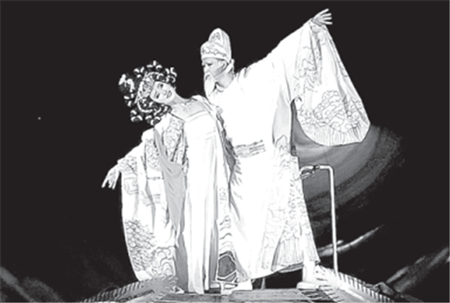 |
|
The dance show The Song of Everlasting Sorrow is a big draw for visitors to Xi'an, Shaanxi province. [Photo by Wang Jian/For China Daily] |
A daytime visit to the Huaqing Palace in Xi'an, Shaanxi province, is remarkably different from coming here by night, when it turns into a natural stage with Mount Lishan as the backdrop.
The Song of Everlasting Sorrow, an epic poem by Bai Juyi on the romance between Emperor Xuanzong of the Tang Dynasty (AD 618-907) and his concubine Yang Yuhuan, is performed as a dance drama at night from April to October. As hundreds of dancers gather around a pool, numerous lights twinkle in the mountain, making the show a spectacle.
It has been viewed by more than 3.1 million people in the past eight years since it started, according to its producer, Zhang Xiaoke.
Other than rich cultural elements, "advanced technology in lighting and 3-D imagery and real historical stories" are needed to make such a large-scale project successful, he says.
In addition, efficient management can ensure two performances a night, including getting an audience of up to 2,500 people to enter and exit the area during a 15-minute break. The open-air arena also provides for the distribution of raincoats among audience members on rainy evenings.
In 2013, the local government made the show an official benchmark for other cultural performances in this province in Northwest China. Now the central authorities plan to issue a new national guideline on such outdoor performances, with the Xi'an shows as a benchmark, too.
At a recent seminar on the subject at the Huaqing Palace, experts on outdoor performances said it was important to have such standards not just to ensure the quality of shows but also to regulate the field.
"Without a proper threshold, it will be a chaotic market," says Mei Shuaiyuan, a longtime promoter of "real scenery shows" in China.
Mei, who also produces such shows, says there are only a handful of genuine performances in the country that can boast of strong storylines and natural settings.
"It's about the Chinese philosophy-the harmony between humans and nature. The best culture, together with the prettiest scenery, make the other look wonderful."
Many Chinese and foreign tourists can soak in local culture and an area's history by going to such shows, he says.
The basic rule for making such shows work is to weave local life into the performances.
The new standards being set by the national administration will be out soon, experts say.
"The standards, including the concept of shows with real scenery, are good for maintaining the program," says Zhang Debing, who looks after Impression Wulong, a performance group in Chongqing that holds shows about local boat trackers' lives, including their work songs.
Zhang says that it is important to have a standard for infrastructure and equipment, such as how much space should be alloted for parking.
In 2003, Mei collaborated with movie director Zhang Yimou to produce one of the country's earliest such shows, Impression Liu Sanjie, in Guilin. It was inspired by the legend of Liu Sanjie, a local singer on the banks of the Lijiang River that runs through the Guangxi Zhuang autonomous region in South China.
The show now makes a net profit of about 100 million yuan ($16 million) a year. Among about 600 performers, nearly half are fishermen from nearby villages.
Nowadays, such shows offer jobs to locals so they do not have to work in big cities far from their hometowns.
Hotels and restaurants usually do brisk business around such venues, and the local governments get their taxes, Mei says.
|
|
|
|
|
|
|
|
